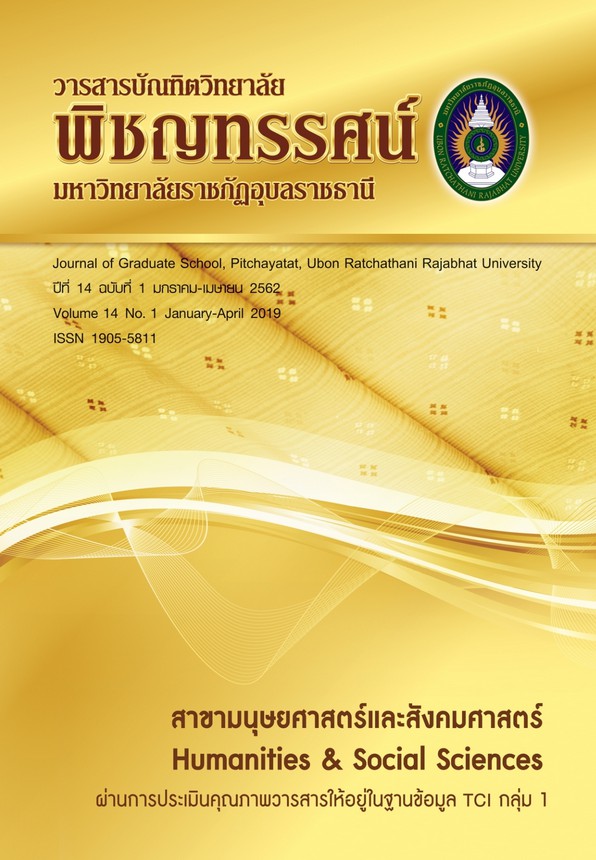การพัฒนากิจกรรมการเรียนรู้คณิตศาสตร์ เรื่อง เรขาคณิตวิเคราะห์ ของนักเรียนชั้นมัธยมศึกษาปีที่ 4 โดยใช้รูปแบบการจัดกิจกรรมการเรียนรู้ตามทฤษฎีคอนสตรัคติวิสต์ร่วมกับการจัดกิจกรรม การเรียนรู้แบบ SSCS
คำสำคัญ:
เรขาคณิตวิเคราะห์, ทฤษฎีคอนสตรัคติวิสต์, การจัดกิจกรรมการเรียนรู้แบบ SSCSบทคัดย่อ
การวิจัยครั้งนี้มีวัตถุประสงค์เพื่อ 1) พัฒนาแผนการจัดการเรียนรู้คณิตศาสตร์ ของนักเรียนชั้นมัธยมศึกษาปีที่ 4 เรื่อง เรขาคณิตวิเคราะห์ โดยใช้รูปแบบการจัดกิจกรรมการเรียนรู้ตามทฤษฎีคอนสตรัคติวิสต์ร่วมกับการจัดกิจกรรมการเรียนรู้แบบ SSCS ให้มีประสิทธิภาพตามเกณฑ์ 75/75 และ 2) เปรียบเทียบผลสัมฤทธิ์ทางการเรียนก่อนเรียนและหลังเรียนเรื่อง เรขาคณิตวิเคราะห์ ของนักเรียนชั้นมัธยมศึกษาปีที่ 4 โดยใช้รูปแบบการจัดกิจกรรมการเรียนรู้ตามทฤษฎีคอนสตรัคติวิสต์ร่วมกับการจัดกิจกรรมการเรียนรู้แบบ SSCS กลุ่มตัวอย่างที่ใช้ในการวิจัย ซึ่งเป็นนักเรียนชั้นมัธยมศึกษาปีที่ 4/2 โรงเรียนอำนาจเจริญ ที่กำลังศึกษาในภาคเรียนที่ 2 ปีการศึกษา 2560 จำนวน 45 คน ได้มาโดยวิธีการชักตัวอย่างแบบกลุ่ม โดยใช้ห้องเรียนเป็นหน่วยการสุ่ม เครื่องมือที่ใช้ในการวิจัยครั้งนี้ ประกอบด้วย 1) แผนการจัดการเรียนรู้คณิตศาสตร์ เรื่อง เรขาคณิตวิเคราะห์ สำหรับนักเรียนชั้นมัธยมศึกษาปีที่ 4 โดยใช้รูปแบบการจัดกิจกรรมการเรียนรู้ตามทฤษฎีคอนสตรัคติวิสต์ร่วมกับการจัดกิจกรรมการเรียนรู้แบบ SSCS จำนวน 7 แผน และ 2) แบบทดสอบวัดผลสัมฤทธิ์ทางการเรียนคณิตศาสตร์ เรื่อง เรขาคณิตวิเคราะห์ จำนวน 30 ข้อ มีค่าความยากตั้งแต่ .40 ถึง .77 คาอำนาจจำแนก ตั้งแต่ .27 ถึง .60 และค่าความเชื่อมั่นของแบบทดสอบทั้งฉบับเท่ากับ .88 สถิติที่ใช้ในการวิเคราะห์ข้อมูล ได้แก่ ค่าเฉลี่ย ส่วนเบี่ยงเบนมาตรฐาน และการทดสอบทีแบบกลุ่มสัมพันธ์ ผลการวิจัยพบว่า 1. ประสิทธิภาพของแผนการจัดการเรียนรู้คณิตศาสตร์ ของนักเรียนชั้นมัธยมศึกษาปีที่ 4 เรื่อง เรขาคณิตวิเคราะห์ โดยใช้รูปแบบการจัดกิจกรรมการเรียนรู้ตามทฤษฎีคอนสตรัคติวิสต์ร่วมกับการจัดกิจกรรมการเรียนรู้แบบ SSCS มีประสิทธิภาพเท่ากับ 78.26/75.56 2. ผลสัมฤทธิ์ทางการเรียนหลังเรียนเรขาคณิตวิเคราะห์ ของนักเรียนชั้นมัธยมศึกษาปีที่ 4 โดยใช้รูปแบบการจัดกิจกรรมการเรียนรู้ตามทฤษฎีคอนสตรัคติวิสต์ร่วมกับการจัดกิจกรรมการเรียนรู้แบบ SSCS สูงกว่าก่อนเรียนอย่างมีนัยสำคัญทางสถิติที่ระดับ .05
เอกสารอ้างอิง
กระทรวง, ศึกษาธิการ. พระราชบัญญัติการศึกษาแห่งชาติ พุทธศักราช 2542 แก้ไขเพิ่มเติม (ฉบับที่ 2) พุทธศักราช 2545. กรุงเทพฯ : คุรุสภา, 2546.
...............หลักสูตรแกนกลางการศึกษาขั้นพื้นฐาน พุทธศักราช 2551. กรุงเทพฯ: กระทรวงศึกษาธิการ, 2552.
ชาคริต เรืองประพันธ์. การพัฒนาผลสัมฤทธิ์ทางการเรียนวิชาคณิตศาสตร์ของนักเรียนชั้นมัธยมศึกษาปีที่ 3 เรื่องสมการกำลังสอง โดยใช้การจัดการเรียนรู้แบบ SSCS ร่วมกับทฤษฎีการสร้างองค์ความรู้ด้วยตนเอง. วิทยานิพนธ์ศึกษาศาสตรมหาบัณฑิต มหาวิทยาลัยรามคำแหง, 2556.
นิตยา ฉิมวงศ์. การเปรียบเทียบความสามารถในการคิดอย่างมีวิจารณญาณและ ผลสัมฤทธิ์ทางการเรียนกลุ่มสาระการเรียนรู้คณิตศาสตร์ เรื่อง ความน่าจะเป็น ของนักเรียนชั้นมัธยมศึกษาปีที่ 3 ที่ได้รับการสอนโดยใช้รูปแบบการเรียนรู้ตามทฤษฎีคอนสตรัคติวิสต์ และการสอนตามปกติ. ปริญญาการศึกษามหาบัณฑิต, มหาวิทยาลัยมหาสารคาม, 2551.
ปาริชาติ ราษแก้ว. ผลการจัดการเรียนรู้แบบ เอส เอส ซี เอส ตามความสามารถในการแก้ปัญหา และการสื่อสารทางวิทยาศาสตร์ ในวิชาฟิสิกส์ของนักเรียนชั้นมัธยมศึกษาตอนปลาย. วิทยานิพนธ์ศึกษาศาสต มหาบัณฑิต มหาวิทยาลัยเชียงใหม่, 2556.
มณีรัตน์ พันธุตา. การศึกษาความสามารถในการแก้ปัญหาคณิตศาสตร์และผลสัมฤทธิ์ทางการเรียนของนักเรียนชั้นมัธยมศึกษาปีที่ 4 โดยใช้รูปแบบ SSCS ร่วมกับกระบวนการแก้ปัญหาของ Ploya. วิทยานิพนธ์ปริญญาศึกษาศาสตรมหาบัณฑิต มหาวิทยาลัยขอนแก่น, 2556.
ยุพิน พิพิธกุล. การเรียนการสอนคณิตศาสตร์. กรุงเทพฯ: คณะครุศาสตร์ จุฬาลงกรณ์มหาวิทยาลัย, 2539.
วิจิตรา บังกิโล. การพัฒนากิจกรรมการเรียนรู้คณิตศาสตร์โดยใช้รูปแบบการจัดการเรียนรู้ตามทฤษฎีคอนสตรัคติวิสต์และเทคนิคระดมสมองที่ส่งเสริมความสามารถในการคิดขั้นสูง เรื่อง ลำดับและอนุกรมชั้นมัธยมศึกษาปีที่ 5. วิทยานิพนธ์ปริญญาศึกษาศาสตรมหาบัณฑิตมหาวิทยาลัยขอนแก่น, 2557.
สันนิสา สมัยอยู่. ผลการจัดการเรียนรู้แบบ SSCS ที่มีความสามารถในการแก้ปัญหาและการสื่อสารทางคณิตศาสตร์ ของนักเรียนชั้นมัธยมศึกษาปีที่ 2 เรื่อง การประยุกต์ของสมการเชิงเส้นตัวแปรเดียว. ปริญญานิพนธ์การศึกษามหาบัณฑิตมหาวิทยาลัยศรีนครินทรวิโรฒ, 2554.
สิริพร ทิพย์คง. หลักสูตรและการสอนคณิตสาสตร์. กรุงเทพฯ: พัฒนาคุณภาพวิชาการ, 2545.
สุรางค์ทิพย์ นครไพร. การพัฒนากิจกรรมการเรียนรู้ที่เน้นทักษะกระบวนการแก้ปัญหาทางคณิตศาสตร์ ตามแนวคิดทฤษฎีคอนสตรัคติวิสต์ เรื่อง เศษส่วนของนักเรียนชั้นประถมศึกษาปีที่ 5. วิทยานิพนธ์ปริญญาศึกษาศาสตรมหาบัณฑิตมหาวิทยาลัยขอนแก่น, 2554.
สุวิทย์ มูลคำ และอรทัย มูลคำ. 19 วิธีจัดการเรียนรู้ : เพื่อพัฒนาความรู้และทักษะ. กรุงเทพฯ: โรงพิมพ์ภาพพิมพ์, 2545.
ดาวน์โหลด
เผยแพร่แล้ว
รูปแบบการอ้างอิง
ฉบับ
ประเภทบทความ
สัญญาอนุญาต
บทความทุกเรื่องได้รับการตรวจความถูกต้องทางวิชาการโดยผู้ทรงคุณวุฒิภายนอกอย่างน้อย 3 คน ความคิดเห็นในวารสารพิชญทรรศน์เป็นความคิดเห็นของผู้นิพนธ์มิใช่ความคิดเห็นของผู้จัดทำ จึงมิใช่ความรับผิดชอบของวารสารพิชญทรรศน์ และบทความในวารสารพิชญทรรศน์สงวนสิทธิ์ตามกฎหมายไทย การจะนำไปเผยแพร่ต้องได้รับอนุญาตเป็นลายลักษณ์อักษรจากกองบรรณาธิการ





